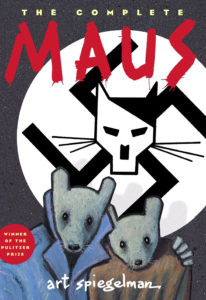Yesterday was the 47th anniversary of the liberation of Auschwitz-Birkenau—the largest of the Nazi concentration and death camps. The United Nations recognizes this day as International Holocaust Day and many countries honor Holocaust victims on other days; for instance, in the United States, we remember the Holocaust in April (this year it takes place April 28).
International Holocaust Remembrance Day serves to commemorate the victims of the Nazi regime, among them Jews, as well as Roma, Sinti, Slavs, disabled persons, LGBTQ+ individuals, and political dissidents. As the number of Holocaust survivors diminishes each year, it’s more important than ever to commemorate them and to listen to their stories.

As an educator committed to equity, inclusion, and justice, and to the free exchange of ideas required to accomplish these aims, I was deeply disturbed—but sadly not surprised—to learn this morning that a school board in Tennessee voted unanimously to ban Art Spiegelman’s Pulitzer Prize-winning graphic novel, Maus from its curriculum because “of its unnecessary use of profanity and nudity and its depiction of violence and suicide.” Maus depicts the experience of the author’s parents in Auschwitz and their attempts to make a life after surviving Auschwitz’s horrors.
As some of you know, I taught high school English for many years. Maus was a cornerstone text of my ninth-grade curriculum. When I was getting my Ph.D. at the University of California, Davis, I co-created and co-taught an undergraduate course on the literature of the Holocaust. A fundamental question of this class was how and whether a writer can represent an inhumane cruelty so horrific it defies language. Spiegelman wrestles with this challenge in Maus, which is as much about the impossible task of creating art about the Holocaust as it is about the Holocaust itself.
As Spiegelman commented to The New York Times regarding the school board’s decision: “This is disturbing imagery. But you know what? It’s disturbing history.” According to the Times, Spiegelman “got the impression” the board members were asking, “Why can’t they teach a nicer Holocaust?”

Pretending the Holocaust and other horrific accounts in history can be taught in a palatable way is disrespectful and dangerous, especially in our polarized world. As educators, we have a responsibility to find age-appropriate ways to teach students real truths about the Holocaust and other atrocious historical events. Students need to understand the past—with all its disturbing and uncomfortable truths—to think critically and to examine their place in society and responsibility in creating a more just and equitable world.
Recent movements to ban books and curricula about our country’s racist history and its effects on contemporary America are deeply troubling—as is the rise in sentiments and actions that encourage and commend racism, antisemitism, and bigotry.
In President Biden’s statement regarding International Holocaust Day yesterday, he noted:
“Today, and every day, we have a moral obligation to honor the victims, learn from the survivors, pay tribute to the rescuers, and carry forth the lessons of last century’s most heinous crime. From the streets of Charlottesville, Virginia, to a synagogue in Colleyville, Texas, we are continually and painfully reminded that hate doesn’t go away; it only hides. And it falls to each of us to speak out against the resurgence of antisemitism and ensure that bigotry and hate receive no safe harbor, at home and around the world.”
I am proud that at Turning Point School and many other schools across the country, we continue to thoughtfully create curricula that address the complex, nuanced, and at times painful issues of our national and global societies. This approach elicits what Trauma Specialist Resmaa Menakem calls “clean pain.”
In My Grandmother’s Hands: Racialized Trauma and the Pathway to Mending Our Hearts and Bodies, he defines clean pain as “the pain that mends and can build our capacity for growth. It is the pain we experience when we don’t know what to do, when we are scared, and when we step forward into the unknown anyway, with honesty and vulnerability.”

We must also commit to using our voices to call out institutions that promote censorship, bigotry, and discrimination under the guise of “protecting” students. When we learn about incidents such as yesterday’s banning of Maus by the McMinn County School Board, we must resist the temptation to compartmentalize it as a disappointing action by a small school board thousands of miles away over which we have no control. Actions such as these are not disappointing; they are dangerous, and they will escalate if we don’t collectively speak out.
In the words of Alice Walker, “The most common way people give up their power is by thinking they don’t have any.” I invite you to harness your power as parents, caregivers, and educators to help ensure that our children and children everywhere will not be denied the ability to accurately understand the past. After all, it is the only way they will be able to design a more just and equitable future, for themselves and for the generations to come.
Warmly,
Laura
Laura Konigsberg
Head of School
lkonigsberg@turningpointschool.org



































Thank you. I agree 100%.
I appreciate the thoughtfulness of your writings, and the eloquence in your presentation. I’m curious if you’ve considered sharing your blog though additional resources such as medium.com?
You have important things to say. I would love to see your voice amplified!